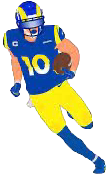- Joined
- Apr 22, 2016
- Messages
- 1,933
Not saying I put a lot of faith in some of the metrics used here, and we certainly have been a lot more successful than some of the "more athletic" teams out there. Interesting emphasis, though, on how we do things differently. Ending suggests special teams and defense would benefit by us adding more traditionally athletic players, but also neglects to look at where we have been drafting for several prior seasons.
Sporting news
The Los Angeles Rams don’t put a lot of stock in athletic testing numbers when targeting prospects in the draft. Instead, they focus on how a player performs on film and their game speed, which is captured by player-tracking data in games or at events like the Senior Bowl or the Combine, where Puka Nacua reached the fastest speed of any prospect in the gauntlet drill or Van Jefferson's GPS tracking at the Senior Bowl.
Their lower emphasis on athletic testing led them to select players such as Cooper Kupp in the third round and Nacua in the fifth last year. This year, they drafted Miami safety Kamren Kinchens in Round 3 despite his 4.65 in the 40.
Kent Lee Platte runs the Relative Athletic Score (RAS) testing database, an overall measurement of a player's athleticism based on weighted testing compared to thousands of peers.
Their 2024 draft class ranked 23rd among all teams in Relative Athletic Score, and their current roster ranks even lower than that compared to the rest of the league. According to Kent Lee Platte, the Rams’ RAS of 6.66 is the lowest in the NFL, significantly lower than the next-closest team (Raiders, 6.91).
The Rams have always beat to their own drum, but it is fascinating to see just how far they really lean away from the rest of the league. The Rams don't take chances on raw athletes in the draft, preferring to take more experienced and older players, and that can be a double-edged sword.
Platte notes that this is how the Rams have seemingly operated for decades, and that hasn't stopped them from being successful recently. However, it is important to note that most of their best players over that time (Aaron Donald, Robert Quinn, Jalen Ramsey, Von Miller) all scored 7.00s or higher in RAS testing. Even recent contributors like Steve Avila, Kobie Turner, Jared Verse, and Byron Young all tested higher, perhaps an indication of them potentially expanding their horizons in the draft.
I think this is one of their biggest issues, as it impacts every phase of the game, particularly on special teams and on defense (see Derion Kendrick's 4.6 40). In my opinion, the Rams have proven to be good enough coaches to take a chance on young, raw athletes instead. However, the Rams are wont to go their own way, and it certainly hasn't diminished their success under Sean McVay.
Sporting news
The Los Angeles Rams don’t put a lot of stock in athletic testing numbers when targeting prospects in the draft. Instead, they focus on how a player performs on film and their game speed, which is captured by player-tracking data in games or at events like the Senior Bowl or the Combine, where Puka Nacua reached the fastest speed of any prospect in the gauntlet drill or Van Jefferson's GPS tracking at the Senior Bowl.
Their lower emphasis on athletic testing led them to select players such as Cooper Kupp in the third round and Nacua in the fifth last year. This year, they drafted Miami safety Kamren Kinchens in Round 3 despite his 4.65 in the 40.
Kent Lee Platte runs the Relative Athletic Score (RAS) testing database, an overall measurement of a player's athleticism based on weighted testing compared to thousands of peers.
Their 2024 draft class ranked 23rd among all teams in Relative Athletic Score, and their current roster ranks even lower than that compared to the rest of the league. According to Kent Lee Platte, the Rams’ RAS of 6.66 is the lowest in the NFL, significantly lower than the next-closest team (Raiders, 6.91).
The Rams have always beat to their own drum, but it is fascinating to see just how far they really lean away from the rest of the league. The Rams don't take chances on raw athletes in the draft, preferring to take more experienced and older players, and that can be a double-edged sword.
Platte notes that this is how the Rams have seemingly operated for decades, and that hasn't stopped them from being successful recently. However, it is important to note that most of their best players over that time (Aaron Donald, Robert Quinn, Jalen Ramsey, Von Miller) all scored 7.00s or higher in RAS testing. Even recent contributors like Steve Avila, Kobie Turner, Jared Verse, and Byron Young all tested higher, perhaps an indication of them potentially expanding their horizons in the draft.
I think this is one of their biggest issues, as it impacts every phase of the game, particularly on special teams and on defense (see Derion Kendrick's 4.6 40). In my opinion, the Rams have proven to be good enough coaches to take a chance on young, raw athletes instead. However, the Rams are wont to go their own way, and it certainly hasn't diminished their success under Sean McVay.







